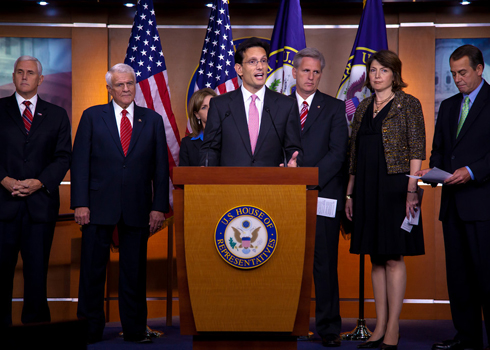One area the Republican party’s anti-spending crusade puts them in a bind is infrastructure spending. Repairing roads and bridges, modernization, etc. have historically been bipartisan priorities — but they’ve also always cost a lot of money.
Ask Republicans whether they want to include transportation infrastructure in their calls for broad spending cuts, and you don’t get a very specific answer.
“We’ve got to learn how to prioritize and do more with less in all areas of government,” said House Majority Leader Eric Cantor at his weekly press conference today. “It just is what it is. In the terms of transportation, we’ve got to figure out ways how to leverage dollars, how to come up with innovative ways to address the nation’s ailing transportation infrastructure.”
There’s a reason for that. Ask instead how they propose to upgrade the country’s transportation infrastructure without new spending, and it turns out there’s no simple answer.
“I don’t think anybody would tell you that our nation’s transportation infrastructure is in a state of existence that we would accept,” Cantor admitted.
We’ve got the aviation industry that, you know, anybody trying to fly in and out of the tri-state airports up there in New York? No. When that area gets clogged up, the whole nation, practically, is delayed. Something needs to be done in that arena trying to bring us into the new digital age here, in terms of those issues. But you look at the bridges in disrepair. The highways — certainly, for sure, we’ve got to be able to address those. There are things that are occurring at the state level, some innovative ways to approach the need for financing. But at the end of the day we’ve got to look to see where the tax revenues are being spent, what they’re being spent on, are the priorities what the American people expect. But this is the kind of analysis that’s got to be undertaken. And it’s going to take work. It’s not some easy answer: just spend more. I mean, again, this is what the American people are tired of, this response, we just need to spend because there’s no other answer. That’s not good enough, because the money’s not there, we don’t have the money.
This is a real fix. On the one hand, the Republicans banned earmarks, so individual members now have less capacity to direct federal dollars to these sorts of projects than they used to have. On the other hand, they also want to diminish the executive branch’s resources, making it less able to tackle these problems alone. That means more and more crumbling roads, more and more unhappy voters, more and more demands from local governments and constituents for Congress to do something about it. But without the will to tax and spend, they can’t.










